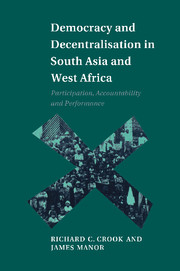1 - Introduction
Published online by Cambridge University Press: 12 October 2018
Summary
During the 1980s, many influential people in African, Asian and Latin American governments, in international development agencies, and in academic life became enthusiastic about decentralisation in less developed countries. A recent World Bank study noted that: ‘out of 75 developing and transitional countries with populations greater than 5 million, all but 12 claim to be embarked on some form of transfer of political power to local units of government'. The devolution of power, responsibility and sometimes resources on to democratically elected councils at local or intermediate levels appealed to very different sets of people who often disagreed on other issues. Economists who had been influenced by neo-liberal ideas saw it as a way of shifting power away from the centralised state which had discredited itself in their eyes through voracious rent-seeking and other abuses. Advocates of pluralist, competitive politics regarded it as a device for prying open closed systems, to give interest groups space in which to organise, compete and otherwise assert themselves. Enthusiasts for efforts by village communities to achieve things through co-operation rather than competition viewed it as a means to that end. The leaders of some autocratic regimes in Asia and Africa saw it as a substitute for démocratisation at the national level, as a safe way to acquire much-needed legitimacy and grassroots support. Democratic politicians in less-developed countries regarded it as a way to make government more responsive to local needs and preferences. Taken together, these diverse groups represented a potent coalition for change.
It was in some ways surprising that decentralisation should arouse such interest, since an earlier wave of experiments with it in Africa and Asia had largely foundered a generation earlier. Beginning in the 1950s in South Asia and in the 1960s in Africa, various attempts had been made to ‘bring government closer to the people’ and to tap the creativity and resources of local communities by giving them the chance to participate in development. But by the early 1970s, most of these initiatives had been vitiated by distrust and interference from above, and by infighting and shortages of resources and expertise in elected councils and local communities.
- Type
- Chapter
- Information
- Publisher: Cambridge University PressPrint publication year: 1998



